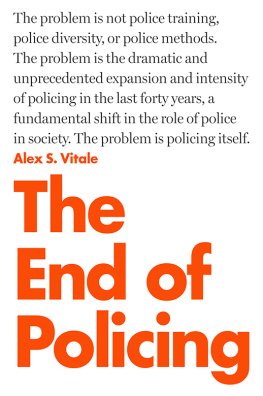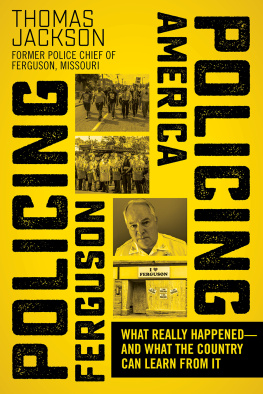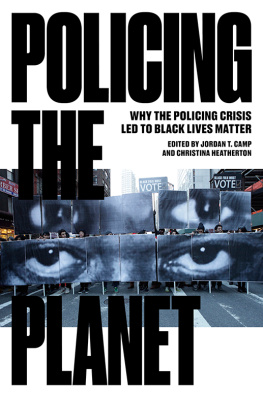Alex S. Vitale
Names: Vitale, Alex S., author.
Title: The end of policing / Alex Vitale.
Description: Brooklyn : Verso, 2017.
Subjects: LCSH: PoliceUnited States. | Police misconductUnited States. |
BISAC: POLITICAL SCIENCE / Political Freedom & Security / Law Enforcement.
| SOCIAL SCIENCE / Discrimination & Race Relations. | POLITICAL SCIENCE /
Public Policy / General.
Tamir Rice and John Crawford were both shot to death in Ohio because an officers first instinct was to shoot. Anthony Hill outside Atlanta, Antonio Zambrano-Montes in Pasco, California, and Jason Harris in Dallas were all shot to death by police who misunderstood their mental illnesses. Oscar Grant in Oakland, Akai Gurley in Brooklyn, and Eric Harris in Tulsa were all shot by mistake because officers didnt use enough care in handling their weapons. North Charleston, South Carolina, police officer Michael Slager shot Walter Scott in the back for fleeing a traffic stop and potential arrest for missed child supportthen planted evidence on him as part of a cover-up, which was backed up by other officers. On Staten Island, Eric Garner was killed in part because of an overly aggressive police response to his allegedly selling loose cigarettes. The recent killings of so many unarmed black men by police, in so many different circumstances, have pushed the issue of police reform onto the national agenda in a way not seen in over a generation.
Is there an explosive increase in police violence? There is no question that American police use their weapons more than police in any other developed democracy. Unfortunately, we dont have fully accurate information about the number or nature of homicides at the hands of police. Despite a 2006 law requiring the reporting of this information (reauthorized in 2014), many police departments do not comply. Researchers have had to rely on independent information such as local news stories to cobble together numbers. One effort by the Guardian and Washington Post documented 1,100 deaths
African Americans are disproportionately victims of police shootings; black teens are up to twenty-one times more likely than white teens to be killed by police,
This form of policing is based on a mindset that people of color commit more crime and therefore must be subjected to harsher police tactics. Police argue that residents in high-crime communities often demand police action. What is left out is that these communities also ask for better schools, parks, libraries, and jobs, but these services are rarely provided. They lack the political power to obtain real services and support to make their communities safer and healthier. The reality is that middle-class and wealthy white communities would put a stop to the constant harassment and humiliation meted out by police in communities of color, no matter the crime rate.
Those who question the police or their authority are frequently subjected to verbal threats and physical attacks. In 2012, young Harlem resident Alvin Cruz, who had been repeatedly stopped and searched by police without justification, taped an encounter with police in which he questioned the reason for the stop. In response, the police officer cursed at him, twisted his arm behind his back, and said, Dude, Im
Even wealthy and more powerful people of color are not immune: in 2009, Harvard professor and PBS personality Henry Louis Gates Jr. was arrested by Cambridge police in his own home; he had lost his keys, and a neighbor had called the police to report a break-in. The incident prompted President Obama to state:
I think its fair to say, number one, any of us would be pretty angry; number two, that the Cambridge police acted stupidly in arresting somebody when there was already proof that they were in their own home, and, number three, what I think we know separate and apart from this incident is that theres a long history in this country of African Americans and Latinos being stopped by law enforcement disproportionately.
Part of the problem stems from a warrior mentality. only fuels this perception, as well as a belief that entire communities are disorderly, dangerous, suspicious, and ultimately criminal. When this happens, police are too quick to use force.
Excessive use of force, however, is just the tip of the iceberg of over-policing. There are currently more than 2 million Americans in prison or jail and another 4 million on probation or parole. Many have lost the right to vote; most will have severe difficulties in finding work upon release and will never recover from the lost earnings and work experience. Many have had their ties to their families irrevocably damaged and have been driven into more serious and violent criminality. Despite numerous well-documented cases of false arrests and convictions, the vast majority of these arrests and convictions have been conducted lawfully and according to proper procedurebut their effects on individuals and communities are incredibly destructive.
Reforms
Any effort to make policing more just must address the problems of excessive force, overpolicing, and disrespect for the public. Much of the public debate has focused on new and enhanced training, diversifying the police, and embracing community policing as strategies for reform, along with enhanced accountability measures. However, most of these reforms fail to deal with the fundamental problems inherent to policing.
Training
The videotaped death of Eric Garner for allegedly selling loose cigarettes immediately spurred calls for additional training of officers in how to use force in making arrests. Officers were accused of using a prohibited chokehold and of failing to respond to his pleas that he couldnt breathe. In response, Mayor Bill de Blasio and Police Commissioner William Bratton announced that all New York Police Department (NYPD) officers would undergo additional use-of-force training so that they could make arrests in the future in ways that were less likely to result in serious injury, as well as training in methods to de-escalate conflicts and more effectively communicate with the public.
Such training ignores two important factors in Garners death. The first is the officers casual disregard for his well-being, ignoring his cries of I cant breathe, and their seeming indifferent reaction to his near lifelessness while awaiting an They presented existing behavioral research that showed that when a car is left unattended on a street it is usually left alone, but if just one window of the car is broken, the car is quickly vandalized. The lesson: failure to indicate care and maintenance will unleash peoples latent destructive tendencies. Therefore, if cities want to establish or maintain crime-free neighborhoods they must take action to ensure that residents feel the pressure to conform to civilized norms of public behavior. The best way to accomplish this is to use police to remind people in subtle and not-so-subtle ways that disorderly, unruly, and antisocial behavior are unacceptable. When this doesnt happen, peoples baser instincts will take hold and predatory behavior will reign, in a return to a Hobbesian war of all against all.







